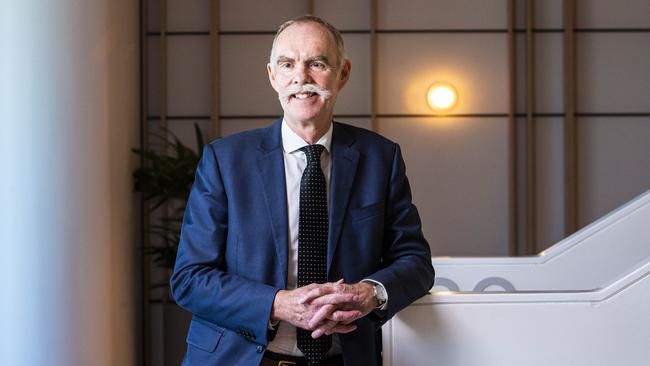Budget should ‘reset the outlook’ for super, says AustralianSuper head Ian Silk
The head of AusSuper says the $3 trillion pool of national savings will rise to $5 trillion by the end of the decade and no side of politics should own it.

Tuesday’s budget is an opportunity to “reset the view” on superannuation away from politics, and see it as a funding pool that can help build out economic growth, said Ian Silk, the head of the $210bn AustralianSuper.
Mr Silk says the pool of national savings of $3 trillion will rise to $5 trillion by the end of the decade and no side of politics should own it.
“If budget night reveals that the superannuation guarantee timetable has been confirmed, then I reckon that represents an opportunity to reset the national view on superannuation.
“We should use that opportunity to pause and recognise the system that is developing because the success of super should not be seen to belonging to one or other side of politics.”
He noted that super savings has helped to build the country’s infrastructure and buffered it through economic crises. And with wages growth stuck in the slow lane, it has democratised capital markets and given workers opportunity to build wealth.
“For the first time it gives all Australian workers access to growth in capital markets, rather than just accumulating wealth that is PAYG salary earned. Were it not for super, this would have never happen to them” he said.
“Super should be in the Australian Hall of Fame of national achievements alongside Medicare and the Future Fund and NDIS.”
Mr Silk says in the last ten years, while the average annual wage growth in Australia has been 2.4 per cent, the S&P/ASX 200 total return has been 7.8 per cent annually over the last decade. And internationally, the annualised S&P 500 total return has been 14.4 per cent.
“We have 9 to 10 weeks until 30 June. Short of a big shock, most balanced plans are going to return 15 per cent. As of Friday the AustralianSuper balanced plan on a financial year to date basis was just over 16 per cent,” he said.
With interest rates at 2 per cent, a net real return of 14 per cent is not the norm, the super chief cautions, but its ten-year return is a healthy 8.8 per cent annually.
Over the last 12 months, the investment team at AustralianSuper has been adapting the portfolio to more uncertain markets to be fit for purpose to manage $300bn by 2024.
Silk says increasing exposure to international markets has literally paid dividends. The team wants to lift holdings of unlisted assets in infrastructure, private equity and also debt and more specialists are being hired for the London office.
“This push into global markets will be further supported by the opening of the New York office later this year which will be heavily weighted towards the private equity markets in the US which are much deeper and further advanced than those in Australia and even in Europe,” Mr Silk said.
About 40 per cent of the funds assets are managed directly in-house, saving $200m in the last financial year. That share is expected to grow to 50 per cent over the next couple of years.
It is scale that Ian Silk says delivers AustralianSuper the leverage to access deals and partnerships ahead of many smaller players. That scale is one of the bug bears of the rival retail super sector and its political allies because much of it has been delivered through default member savings.
“No stakeholder in the industry is blameless, me and AustralianSuper included” Mr Silk said of the super wars.
“If all parties were to lay down their arms and confirm the purpose of super and work to achieving that, then not only would the move from 9.5 per cent to 10 per cent be a good thing for all members of super funds, but it could be seen as a major turning point in what has been a pretty partisan debate about it.
“The success of the super system should not be seen as an achievement of one or other side of politics” he said, crediting the current minister Jane Hume.
“She (Senator Hume) has made a number of critical and fundamental improvements to the system: the focus on ridding the system of multiple accounts has been very positive; she’s facilitated the raft of mergers that are occurring at the moment by changing the tax environment; and she has rid the system of low balanced accounts. We haven’t agreed with everything she has done, but it is not as if one party deserves all the accolades and the other party none.”
One wonders if Paul Keating, founding father of the super guarantee would agree.







To join the conversation, please log in. Don't have an account? Register
Join the conversation, you are commenting as Logout